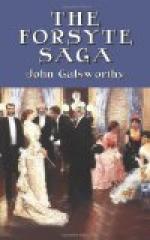“My father was fond of her,” he said quietly.
“Why he should have been I don’t know,” Soames answered without looking round. “She brought trouble to your daughter June; she brought trouble to everyone. I gave her all she wanted. I would have given her even—forgiveness—but she chose to leave me.”
In Jolyon compassion was checked by the tone of that close voice. What was there in the fellow that made it so difficult to be sorry for him?
“I can go and see her, if you like,” he said. “I suppose she might be glad of a divorce, but I know nothing.”
Soames nodded.
“Yes, please go. As I say, I know her address; but I’ve no wish to see her.” His tongue was busy with his lips, as if they were very dry.
“You’ll have some tea?” said Jolyon, stifling the words: ’And see the house.’ And he led the way into the hall. When he had rung the bell and ordered tea, he went to his easel to turn his drawing to the wall. He could not bear, somehow, that his work should be seen by Soames, who was standing there in the middle of the great room which had been designed expressly to afford wall space for his own pictures. In his cousin’s face, with its unseizable family likeness to himself, and its chinny, narrow, concentrated look, Jolyon saw that which moved him to the thought: ’That chap could never forget anything—nor ever give himself away. He’s pathetic!’
CHAPTER VII
THE COLT AND THE FILLY
When young Val left the presence of the last generation he was thinking: ’This is jolly dull! Uncle Soames does take the bun. I wonder what this filly’s like?’ He anticipated no pleasure from her society; and suddenly he saw her standing there looking at him. Why, she was pretty! What luck!
“I’m afraid you don’t know me,” he said. “My name’s Val Dartie—I’m once removed, second cousin, something like that, you know. My mother’s name was Forsyte.”
Holly, whose slim brown hand remained in his because she was too shy to withdraw it, said:
“I don’t know any of my relations. Are there many?”
“Tons. They’re awful—most of them. At least, I don’t know—some of them. One’s relations always are, aren’t they?”
“I expect they think one awful too,” said Holly.
“I don’t know why they should. No one could think you awful, of course.”
Holly looked at him—the wistful candour in those grey eyes gave young Val a sudden feeling that he must protect her.
“I mean there are people and people,” he added astutely. “Your dad looks awfully decent, for instance.”
“Oh yes!” said Holly fervently; “he is.”
A flush mounted in Val’s cheeks—that scene in the Pandemonium promenade—the dark man with the pink carnation developing into his own father! “But you know what the Forsytes are,” he said almost viciously. “Oh! I forgot; you don’t.”




